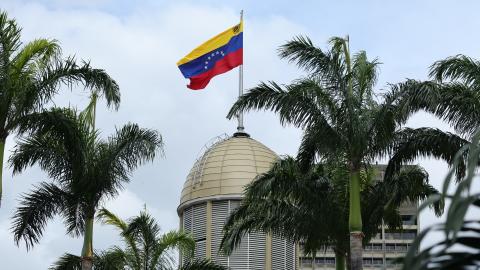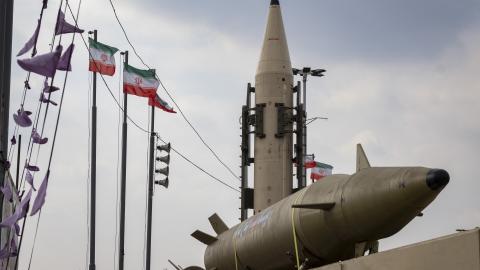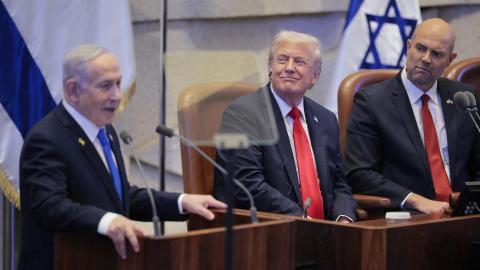It does not matter what happens next; President Trump really does deserve the Nobel Peace Prize. His achievement will stand whether renewed hostilities break out in Gaza, or Netanyahu joins Bono and Qatar’s Tamim bin Hamad Al Thani to sing about peace onstage in Khan Younis. Compelling the release of all living hostages held by Hamas in return for a ceasefire and tolerable concessions is as close as one gets to a miracle in the business of diplomacy. Donald Trump, along with Steve Witkoff, Jared Kushner, Marco Rubio, and their teams, deserve the world’s admiration.
Barely a week ago, Israel appeared trapped. It had three options in Gaza, each of them unattractive. It could level what was left of the place, probably causing the deaths of many of the remaining hostages, and finally defeat Hamas on the battlefield in a conventional sense while signing up for further isolation and endless trouble in whatever came next. It could attempt to wash its hands of Gaza somehow, the least likely choice, inasmuch as the presence of the hostages would perpetually deny Israel the freedom to move on. A third path, perhaps the worst, seemed the most probable: an endless rope-a-dope in which Hamas would dribble out limited concessions and groups of hostages here and there as it played for time.
The Trump administration’s demand that any agreement begin with the release of all remaining hostages seemed less an achievable goal than a (welcome) statement of moral clarity, telegraphing the guilt of Hamas while recognizing the justice of Israel’s ongoing Israeli military action. In contrast to the appalling decisions by leaders like Keir Starmer and Emmanuel Macron to recognize a Palestinian state as a de facto reward for October 7, the framing of Trump’s diplomatic push made clear that bad behavior would not be rewarded, but punished. But how was it going to work? Why would the remaining genocidal thugs leading Hamas in Gaza (not their pampered counterparts abroad, let alone their ultimate sponsors in places like Qatar) actually let all the hostages go? Why would they give up such extraordinary leverage, when the hostages remained a dagger lodged in the heart of Israel’s politics, tearing the country apart and provoking military action that was slowly isolating Jerusalem from much of the world? Despite the toll of war on Hamas itself, the suffering of ordinary Gazans had not only been a price Hamas considered worth paying but a feature of its strategy for two years already. What could change for year three?
What had changed was that the president and his team, since January, had been taking a page from Seinfeld’s George Costanza and essentially doing the opposite of whatever the Biden team might have done. The Biden team had prioritized the avoidance of escalation and the cessation of hostilities in ways that perversely ensured that the fighting and suffering would continue, just on terms less favorable to Israel. President Trump aligned much more closely with Jerusalem. He backed its campaign against Iran, and even intervened on its side. (I am still waiting for World War III, prophesied so confidently by Tucker Carlson and other Trump critics!)
And whatever tension Israel’s strike against Hamas leadership in Doha may have caused behind the scenes, in public no major rift emerged. If anything, that apparently unsuccessful attack seems to have communicated to the Qataris and other Arab nations that immunity was not guaranteed, and the longer Hamas was allowed to get away with its crimes, the more likely it was that violence and instability were going to come home to them.
Aligning with Israel, being comfortable with escalation when prudent, and seizing the moment presented by the Doha strike to apply pressure on Hamas’s sponsors—all without losing the moral clarity that came with demanding all the living hostages come home first—have led to the current moment in the region. Very little about the future of Gaza is yet resolved, but among the amazing consequences of this diplomatic coup is that the future of Gaza suddenly matters a lot less. The kindest thing that could have been done for the people of Gaza would actually have been the continued prosecution of the IDF’s campaign to a successful conclusion. But for now, Hamas is still there, taking revenge on rival Gazan militias, and reinforced with prisoners released by Israel.
But with the hostages released, Israel and the rest of us suddenly have the freedom to prioritize the Gaza file appropriately. Perhaps there will be a meaningful path to a healthier Gazan politics woven into the complicated matrix of future normalizations and arrangements that the Trump administration is now pursuing with Arab and Muslim powers. I am skeptical—but then, I was also skeptical regarding the full release of hostages! In any event, Gaza’s overnight deprioritization—in what was for Israel a seven-front conflict—is an enormous relief, as America and Israel work to shape a region utterly transformed by two years of war. In a bitter irony for the region’s terrorists, this transformation is almost entirely for the benefit of America and Israel.
The major challenge ahead—to hasten the decline of the Iranian neo-imperial project while managing the coming contact between Turkish neo-imperialism and a newly dominant Israel, principally in Syria—can now be pursued without distraction. Israelis can begin to enjoy the new margins of safety their heroic self-defense has earned them. America can pursue its own interests with a confident and dominant Israel as its partner. Perhaps the Trump administration will add new achievements to the coups of the Abraham Accords and this astonishing hostage deal. Where the Biden administration was decent at starting fires in the Middle East, this team has proven adept at putting them out, and reordering the region in ways that advance America’s interests.
At home, the president’s stalwart defense of Israel, his willingness to marry prudential military force to the active pursuit of diplomacy, and the now objectively positive outcomes of this strategy, will make life complicated for the isolationists and conspiratorial fantasists like Carlson, who welcomed the Trump administration but who are aghast at the last year of its Middle East policy. Tough break.
Meanwhile, the critics of Israel who have been marching from Columbia’s Low Library to London’s Trafalgar Square demanding a ceasefire seem oddly nonplussed now that Donald Trump has actually brokered one. Their disappointment at how favorable the deal is to Israel—and indeed, we might surmise, that the hostages have been released at all and Israeli sovereignty is accepted as a given—is palpable. Their radicalism is a reminder of the danger of this moment, where we have a battle for the soul of the West playing out on our streets and campuses while actual fires rage on its perimeters in Ukraine and Israel.
The performance of the Trump team this week gives hope that these battles, both spiritual and actual, might be won.















